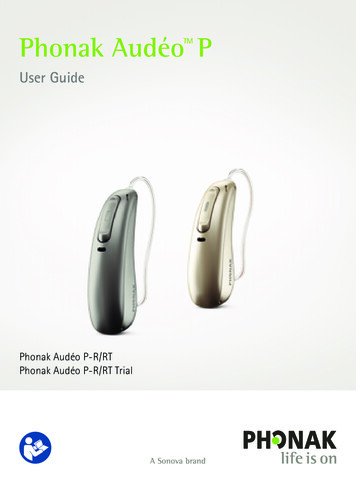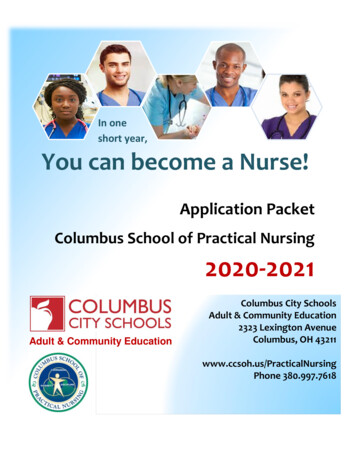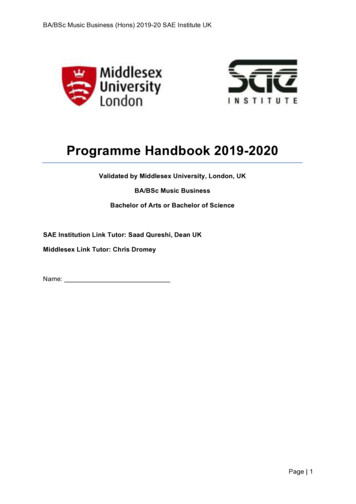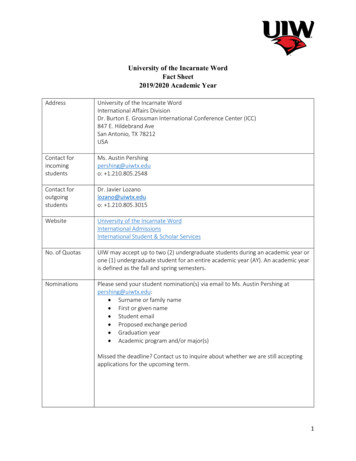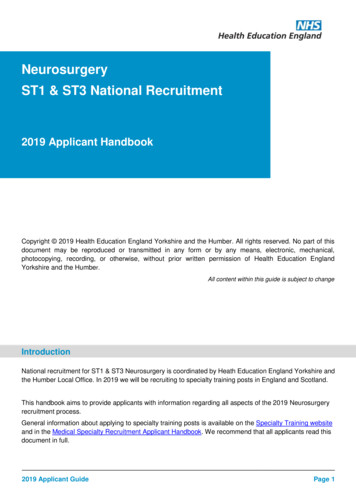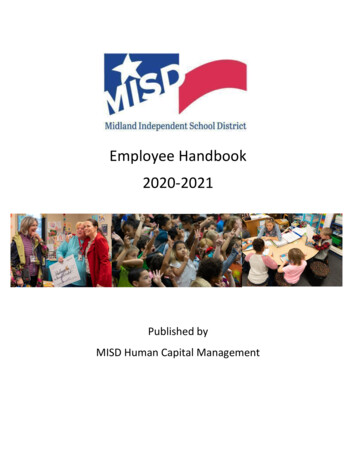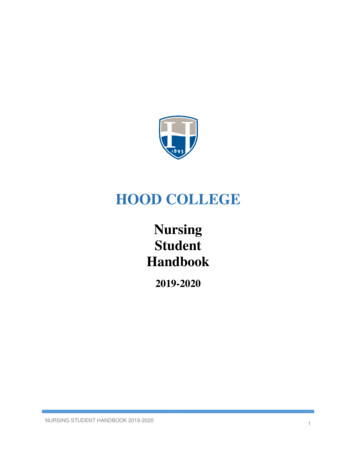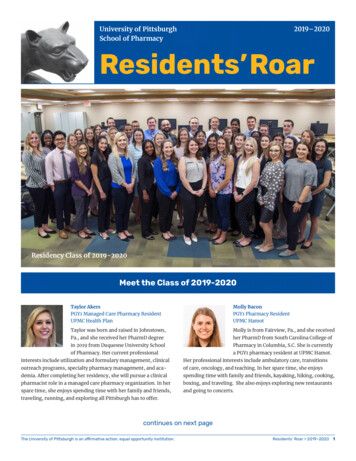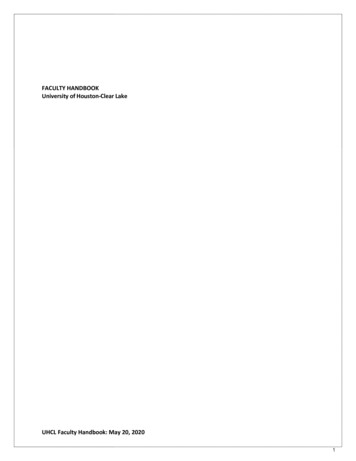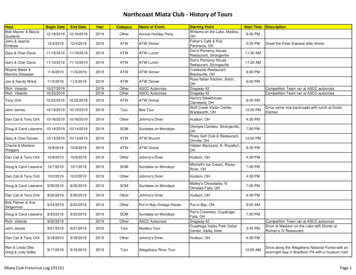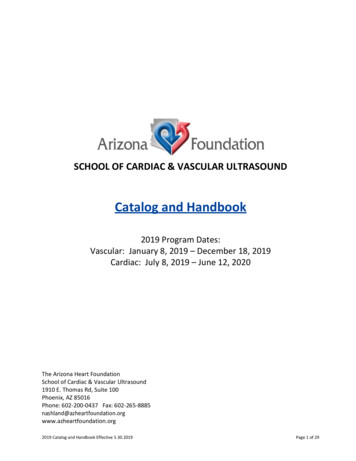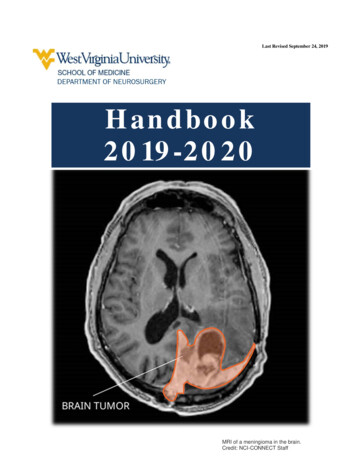
Transcription
Last Revised September 24, 2019Handbook2019-2020MRI of a meningioma in the brain.Credit: NCI-CONNECT Staff
Table of ContentsOverview of Neurosurgical Training Program, Aims .4Professionalism .5Resident Selection Process and Criteria .6Physician Licensure Requirements .7Clinical Competency Committee (CCC).7Program Evaluation Committee (PEC) .7Duties of the Residents in Each Year .8Promotion, Criteria for Yearly Advancement .10Scholarly Activity Requirement .11Research Procedures and Ethics .11Quality Improvement (QI) Project Requirements .11Conferences and Attendance .12Evaluations .15Departmental Policies and Procedures .16Well Being.18Diversity and Non-Discrimination .19Handoffs and Transitions of Care .19Fit for Duty .21Case Logging Policy .23Supervision and Progressive Responsibility Policy .23Mandatory Notification of Faculty .28Moonlighting .28Time Away, Vacation, Holiday, and Sick Time Policies .29Resident Schedules, Meals, Email, and Pagers .29Clinical and Educational Work Hours.30Academic Disciplinary Policy and Procedures, Grievance .31Employment Grievance Procedure for Non-Academic Issues .33Internet, Electronic Networking and Other Media .33Institutional or Program Closure and Reduction .33Practitioner Health Committee .33WVU Medicine Resident Physician Manual.34Patient Safety Net .34Things Patient Safety Champions Should Know .35Mistreatment and Professionalism Reporting .38Interactions with Vendor Representatives .38Institutional Disaster Policy .38Resident Spending Guidelines.39Rotation Goals and Objectives .40Level Three Leadership: Getting Below the Surface .43Graduate Medical Education Policy on Supervision from GME Bylaws .52
West Virginia University Health Sciences CenterDepartment of Neurosurgery Resident ManualOverview of Neurosurgical Training Program, AimsThe mission of the clinical training program is excellence in patient care, scholarship, and neurosurgical education.Program goals have been established to assure this mission is successfully executed. Residents first establishfundamental clinical and surgical skills. As training progresses, increasing neurosurgical expertise, both clinical andscholarly, is acquired. Upon completion of the neurosurgery residency training program, each graduate is highlyskilled in managing the full spectrum of neurosurgical disease, and has developed the scholarly tools needed tocontribute to the peer-reviewed literature. The resident is required to publish 6 PubMed indexed articles, as well aspass the ABNS Written Board Exam in order to matriculate from the program.The WVU Neurosurgical Residency is a 7 year (84 months) program. There are 60 months of core clinicalneurosurgery of which 12 months are the chief residency. In the internship, there is a six-month rotation in generalcare and a six-month rotation in neurocritical care. Longitudinal clinical experiences in anesthesia, neurology, painmedicine, pathology, and radiation oncology are distributed across this year. Beginning in PGY2, the residentbegins to rotate on the clinical neurosurgery services. At times, Drs. Lee, Meltzer, and Serrano may functionindependently as a separate service with a dedicated resident when the resident curriculum schedule dictates such.The fourth year is the academic year, and is devoted to scholarly pursuit or enfolded fellowships. Academic pursuitmay include graduate classes. The fifth year includes dedicated rotations in pediatrics and endovascular. The PGY6and PGY7 split senior and chief responsibilities. The chief resident takes overall responsibility for the entire service.In summary, there are 12 months of internship, 24 months of clinical junior residency, a year of academic work,another 24 months of clinical senior rotations, and 12 months of clinical neurosurgery serving as chief resident.Neuro-critical care experience is emphasized throughout the training, as well as extensive exposure to subspecialtyservices including neurovascular, neuro-oncology, epilepsy surgery, spinal neurosurgery, stereotactic radiosurgery,neurotrauma, functional neurosurgery and pediatric neurosurgery. Conferences are protected from clinicalcommitments and include morbidity and mortality conference, case conference, tumor board, asynchronous learningand board review, and journal club. Subspecialty conferences such as Epilepsy Conference or Spine Conference areencouraged. The anatomic dissection lab is available for scholarly work or preparation for operative cases.Preparation of scientific manuscripts, review articles, book chapters and abstracts, as well as presentation skills andleadership/administrative skills are fostered within a structured mentored environment in a multidisciplinary fashion.Overall Program Goals, Objectives, and Graduation RequirementsThe overall goal of the residency program is to develop in our graduating residents a proficiency level appropriate fora new and independent practitioner in the six core competencies as outlined by the ACGME. We follow the standardsput forth by the Neurosurgery RRC of the ACGME in the milestones project. Ideally, residents will achieve Level4 across all of these milestones for graduation. These guidelines can be seen at ACGME Neurosurgery ilestones/NeurologicalSurgeryMilestones.pdf) These milestones reflect: Patient care that is compassionate, appropriate, and effective for the treatment of health problems and thepromotion of health.Medical knowledge about the established and evolving biomedical, clinical and cognate sciences and theapplication of this knowledge to patient care.Practice based learning and improvement, which involves investigation and evaluation of patient care, theappraisal and assimilation of scientific evidence, followed by improvement in patient care.
Interpersonal and communication skills resulting in effective information exchange with patients, theirfamilies, and other health professionals. Professionalism manifested through a commitment to carry out professional responsibilities, adherence toethical principles, and sensitivity to a diverse patient population. Systems-based practice as manifested by actions that demonstrate an awareness of and responsiveness to thelarger context in systems of healthcare and the ability to effectively mobilize system resources to providecare that is of optimum value.Each rotation is designed with these overall goals in mind. In order to direct progress, goals and objectives havebeen formulated for each rotation and approved by the PEC. Unique aspects of each rotation are outlined in thishandbook, and the specific goals and objectives for each rotation are delineated in the appendix. Our assessmenttools are designed to demonstrate progress towards these objectives by directly mapping to the milestonesrequirements using a common format.Residents are responsible for reviewing all general and specific goals and objectives prior to beginning each rotation.ProfessionalismIn keeping with the Common Program Requirements effective 7/1/2013, our GME programs wish to ensure:1. Patients receive safe, quality care in the teaching setting now.2. Graduating residents provide safe, high quality patient care in the unsupervised practice of medicine inthe future.3. Residents learn professionalism and altruism in a humanistic, quality, learning environment.To that end, we recognize that patient safety, quality care, and excellent learning environments are about much morethan duty hours. Therefore, we wish to underscore any policies which address all aspects of the learningenvironment, not just duty hours. These include:1. Professionalism, including accepting responsibility for patient safety2. Alertness management3. Proper supervision4. Transitions of care5. Clinical responsibilities6. Communication and teamwork7. Health Care DisparitiesResidents must take personal responsibility for and faculty must model behaviors that promote:1. Assurance for fitness of duty2. Assurance of the safety and welfare of patients entrusted in their care3. Management of their time before, during, and after clinical assignments4. Recognition of impairment, including illness and fatigue, in self and peers5. Honest and accurate reporting of duty hours, patient outcomes, and clinical experience dataThe institution further supports an environment of safety and professionalism by:1. Providing and monitoring a standard Transitions Policy as defined at Handoffs and Transitions ofCare ndoffsandtransitionsofcare2017logo.pdf. Thispolicy is also available on the SOLE GME website (https://sole.hsc.wvu.edu/).2. Providing and monitoring a standard policy for Duty Hours executed in E-value and defined formallyon the GME website.3. Providing and monitoring a standard Supervision Policy as defined by the 2017 ACGME policySupervision Policy ion-policy.pdf.A Supervision option is provided at the Mistreatment Button that will allow immediate anonymousreporting of inadequate supervision directly to the form/
4.5.6.7.8.Providing and monitoring a standard master scheduling policy and process that is congruent acrossboth E-value and hospital resources.Adopting an institution-wide policy that all residents and faculty must inform patients of their role inthe patient’s care.Providing and monitoring a policy on Alertness Management and Fatigue Mitigation strategy 7/alertnessmanagementpolicy1-15-16.pdf):a. Online modules for faculty and residents on signs of fatigue.b. Fatigue mitigation, and alertness management including back up call schedules and promotionof strategic napping.Assurance of available and adequate sleeping quarters when needed.Requiring that programs define what situations or conditions require communication with the attendingphysician.Process for implementing the Professionalism PolicyThe program and institution will assure effective implementation of the Professionalism Policy by the following:1.Program presentations of this and other policies at program and departmental meetings.2.Core Modules for faculty and residents on Professionalism, Duty Hours, Fatigue Recognition andMitigation, Alertness Management, and Substance Abuse and Impairment.3.Institutional Fitness for Duty and Drug Free Workplace policies.4.Institutional Duty Hours Policy, which adopts ACGME Duty Hours Language.5.Language added specifically to the Resident Manual and the Resident Contract regarding Duty HoursPolicies and the responsibility for and consequences of not reporting Duty Hours accurately.6.Comprehensive Moonlighting Policy incorporating ACGME requirements. Orientation presentationson Professionalism, Transitions, Fatigue Recognition and Mitigation, and Alertness Management.Monitoring Implementation of the Policy on ProfessionalismThe program and institution will monitor implementation and effectiveness of the Professionalism Policy by thefollowing evaluations of residents and faculty including:1. Daily rounding and observation of the resident in the patient care setting.2. Evaluation of the residents’ ability to communicate and interact with other members of the health careteam by faculty, nurses, patients where applicable, and other members of the team.3. Semi-annual competency based evaluation of the residents.4. Semi-annual Milestone reporting to the ACGME.5. By the institution via the Annual Program Evaluation (APE) and Special Program Review process.6. By successful completion of modules for faculty and residents on Professionalism, Impairment, DutyHours, Fatigue Recognition and Mitigation, Alertness Management, and others.7. Program and Institutional monitoring of duty hours and procedure logging as well as duty hourviolations in E-Value.Resident Selection Process and Criteria1.Applications will be accepted via ERAS.2.Applicants will be invited for interview based on a review of the following factors:a. performance on standardized tests,b. medical school performance,c. letters of recommendation,d. personal statement,e. extra-curricular activities,f. research activities.
3.Applicants will be ranked on the basis of the preceding factors in combination with a subjective evaluationof the interview by the faculty.4.Residents will be accepted via the National Residency Matching Program.5.If the program does not fill through the usual matching process, the position will be filled outside the matchfrom available applicants. The most qualified individuals based on the above factors may be invited forinterview.6.There must not be any discrimination in the selection process with regard to race, age, religious affiliation,creed, sexual orientation, gender, gender identity, color, national origin, disability or veteran status.7.Further information can be found in the institutional document Criteria for the Selection of f)Physician Licensure RequirementsAs of July 2019, all residents and fellows in training programs sponsored by the West Virginia UniversitySchool of Medicine must hold at all times during their training either a valid educational training permit ora valid unrestricted license by either the West Virginia Board of Medicine or the West Virginia OsteopathicBoard of Medicine. It is the trainee’s responsibility to request the initial permit or license from theappropriate board of medicine and to annually renew this authorization during their training.For more information, please go dfClinical Competency Committee (CCC)The Clinical Competency Committee serves at the invitation of the Program Director andforms the highest departmental authority in the evaluation of each resident in terms ofattainment of milestones for reporting to the ACGME, and makes recommendations to theProgram Director for advancement or remediation or dismissal.All core faculty are invited for participation in the CCC. Dr. Voelker serves as CCC Chair.Program Evaluation Committee (PEC)The Program Evaluation Committee is the guidance committee which makes recommendationsto the Program Director for determination or modification of the curriculum, policy, andprocedures of the training program. The PEC meets at least yearly to review all program data andcreate action plans for program improvement. The Program Director, at the recommendation ofthe PEC, has authority to modify the contents of this manual at any time to respond to real orpotential deficiencies in the program, as determined by the PEC. When this occurs, all residentswill be notified of new policy by departmental email.Current members of the PEC are all core faculty and one resident representative.Table of Contents
Duties of the Residents in Each YearDuties of the residents in the WVU Neurosurgical Residency program are structured to provide a graduated experienceand involvement in neurosurgical patient management and preoperative, intraoperative, and postoperative patient care,foster a learning environment to develop the resident as a neuroscientist, and mentor the resident to mature as athoughtful, caring, and compassionate physician.The WVU Department of Neurosurgery residency training program adheres to the Milestones Evaluation Standard asdescribed by the Neurosurgery RRC of the ACGME, and the Matrix Curriculum as put forth by the Society ofNeurological Surgeons.The standard rotation schedule for neurosurgery rotations is depicted below. Note that variations will occurbased on individual circumstances and personnel changes.CurriculumYearPGY-1RotationDurationGeneral Care & Clinical Neuroscience6 monthsNeurocritical Care6 monthsNeurosurgery - Junior6 monthsNeurosurgery - Junior6 monthsPGY-3Neurosurgery - Junior PedsNeurosurgery - Junior3 months9 monthsPGY-4Academic RotationPGY-5Pediatric Neurosurgery3 monthsNeurosurgery - Senior9 monthsPGY-212 monthsPGY-6Neurosurgery – Senior/Chief Resident12 monthsPGY-7Chief Resident & Subspecialty12 monthsPGY 1—First Year Neurosurgery ResidentThe PGY1 year is divided into two six-month rotations. One rotation will be in General Care and ClinicalNeurosciences, and will incorporate experiences in trauma, endovascular, radiation oncology and gammaknife. The second block will be in Neurocritical Care, and will incorporate training in anesthesia as well. Theintern is integrated into the Neurosurgical Inpatient Service throughout the year. Neurosurgical bedsideprocedures must be done WITH direct supervision and logged on the provided procedure tracking log beforeany such procedures can be done with indirect supervision. A Training License from the West VirginiaMedical Board is required prior to starting the PGY1 year. The USMLE Step 3 exam must be taken in thisyear.PGY 2-3—Second and Third Year Neurosurgery ResidentThe PGY-2 and 3 years are spent on the general neurosurgery service at Ruby Memorial Hospital. The resident willtake a leadership role in the primary management of the inpatient service. The resident will begin to develop theskills of neurosurgical patient management by following the patient through the course of their treatment with moreinvolvement in surgical care as neurosurgical patient care skills develop. In addition, the 3rd year resident isexpected to design an independent research curriculum for their PGY4 year (see below).
PGY 2-3 — Clinical and Academic DutiesHospital patients are generally in the ICU or on the post-op surgical floor although some patients, including mostconsultation patients, are on other floors. The census generally runs from 25-40 patients. Residents make early morningrounds, evaluating and examining all patients, reviewing charts and studies, and planning dispositions. Rounds may bemade with the attending in the morning, or later in the day, depending on the operative schedule and meetings,emergencies, and other factors at the direction of the attending. The residents and medical students are fully integratedinto the outpatient clinics. Patients are first seen by a resident and/or medical student. The attending then sees the patientand the case is discussed with the resident. The resident will create the consultation or post op note but it will be read,corrected, and signed by the attending. When other duties permit, the junior resident is expected to report to theoperating room whenever possible. The resident is allowed increasing involvement in the operation as surgical skillsimprove. Following or during the operation details are discussed and critiqued and recommendations for improvementmade. On Friday, all residents not on vacation attend the didactic block. When possible, the resident is encouraged toattend any others of the multiple conferences at the Health Science Center. The PGY3 resident will spend 3 months onthe pediatric neurosurgical service. Both PGY2 and PGY3 will take the neurosurgery written board exam for selfassessment. The PGY3 resident is expected to at least pass the exam prior to taking it for credit in PGY4. The PGY2resident must obtain a WV License prior to matriculating to PGY3. ECFMG residents must obtain WV Licenseprior to matriculating to PGY4.PGY4—Fourth Year Neurosurgery ResidentThe fourth year of training is spent in pursuit of neurosurgical scholarship or selected subspecialty offerings, oftenin a laboratory in the Center for Neuroscience or a departmental faculty member. We also encourage enfoldedclinical experiences in neuro critical care for residents who have interest. The resident is expected to develop a planwell in advance with the program director. Clinical duties are limited, though call coverage is expected to maintainclinical skills through this period. This academic year is an opportunity for the resident to fine-tune their skills inacademic pursuit including research design, conduct, and ethics, as well as academic professional communicationskills. The content of the investigation is largely determined by the interests of the resident, but must be of highquality as determined by the program director and CCC. It is furthermore expected that the PGY4 resident take thewritten board exam, and pass it, in this year.Graduation RequirementIt is required prior to graduation that every resident will have at minimum 6 PubMedindexed, peer reviewed papers in print (roughly one per year).PGY5—Fifth Year Neurosurgery ResidentIn the fifth year, the resident returns to the RMH service as a senior resident, spending 3 months running thepediatric neurosurgery service, and the other 9 months on the neurosurgery service as well as experience inendovascular procedures. The resident has more autonomy in the operating room under the direction of theneurosurgical staff. Managerial skills are developed and implemented during this year. Medical student and juniorresident teaching are encouraged through daily rounds and conference lectures, and the resident will receivededicated didactic training to better fulfill these roles.PGY6—Sixth Year Neurosurgery ResidentIn the sixth year, the resident takes a leadership role on the RHM service in preparation for chief residency. When thechief resident is unavailable to take chief call, the PGY-6 will fill this role. The resident is expected to begin to assistor perform the most complex level of operative cases. The resident will begin to transition into the chief role halfwayinto their PGY6 year.
PGY7—Seventh Year Neurosurgery ResidentAt the midway point of the PGY-6 year, the resident is amply prepared for the true chief residency. The chief residentis fully responsible for coordination of all patient care at RMH, resident manpower decisions, complication review,and the conference and call schedules. The total duration of the chief residency is 12 months, as per RRCrequirements.Clinical and Academic Duties (NS6-7)The NS6-7 year, the resident is responsible for the day-to-day running of the neurosurgical service under the supervisionof the faculty. He/she is expected to discuss and plan patient management including surgical operations with theattendings, take leading roles in patient evaluation, planning of treatment, surgical procedures, and postoperative care.He/she is responsible for supervising resident assignments to the clinic and operating room, reviewing call and vacationschedules, and supervising the junior residents and medical students. He/she provides overall supervision forconferences including data collection for morbidity and mortality conferences, and works with the Chairman ofNeurosurgery and the Program Director to support the academic learning experience. He/she communicates with ChiefResidents in other medical and surgical specialties to coordinate consultations, manage multi-trauma or other casesrequiring team management. At this level, the resident is responsible to be fully familiar with billing and coding, medicalliability and patient safety issues, governmental regulatory concerns and practice development. It is anticipated that thefinishing resident will be fully qualified to practice the highest level of neurosurgery.Promotion, Criteria for Yearly AdvancementThere are several areas where a resident must demonstrate accomplishments and proficiency to advance to the next levelof training or be considered qualified to practice neurosurgery at the highest level. These are as follows: proficiency in the6 Competencies, satisfying graduate medical requirements, satisfying ACGME Milestone requirements, successfulcompletion of the written neurosurgical board exams for the appropriate year of training, Quality Improvement and PatientSafety (QI/PS) research project involvement, and scholarly activity (presentations and manuscript preparation).Graduation Requirement:The Resident must pass the written board exam when taken for self-assessment BEFORE beingallowed to take the exam for credit. This effectively means that the exam must be passed for practicein the PGY3 year in order to take it for credit during the PGY4 year (exceptions will be considered bythe CCC on a case-by-case basis).The resident is strongly recommended to achieve the 50th percentile on the written board examduring the PGY4 year to avoid a direct CCC review of their performance.Oral examinations by the faculty will be incorporated into the CCC evaluations for each rotation. Poor performance onoral examinations may be cause for remediation, failure to advance, or dismissal. The practice of an excellent standardof medical care in each area of the six competencies is regularly evaluated through the biannual evaluation process aswell as in regular clinical mentoring. Milestone evaluations are reported to the ACGME biannually. By participatingwith the American Board of Neurological Surgery (ABNS) examinations, the Residency Review Committee forNeurological Surgery (RRC) and the Accreditation Council for Graduate Medical Education (ACGME) oversight, theresidents are assessed compared to national standards for neurosurgery. The WVU School of Medicine requires thecompletion of Core Curriculum Modules for resident advancement to the next year of training. Duty hours andoperative case logs must be up to date daily, and medical documentation must be timely.Table of Contents
Scholarly Activity RequirementIt is required prio
Department of Neurosurgery Resident Manual . Overview of Neurosurgical Training Program, Aims . The mission of the clinical training program is excellence in patient care, scholarship, and neurosurgical education. Program goals have been established to assure this mi
